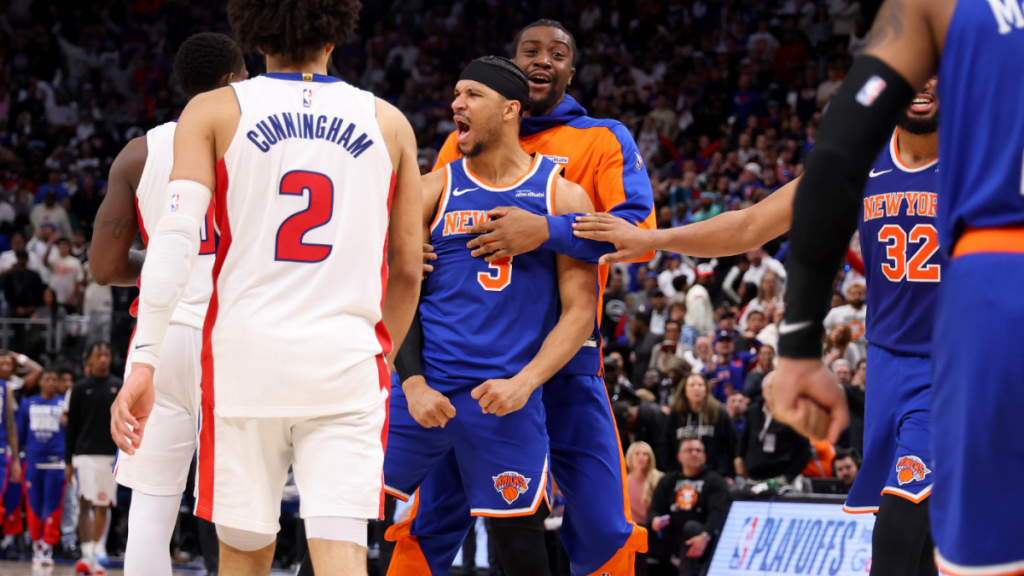In a nail-biting finish, the Detroit Pistons fell just short against the New York Knicks, losing 94-93 in Game 4 of their first-round playoff series. With only 11.1 seconds on the clock and the Pistons trailing by a single point, Cade Cunningham had an opportunity to take the lead but missed a contested mid-range jumper. The outcome sparked significant controversy as Pistons coach J.B. Bickerstaff expressed frustration over a non-call that occurred during the scramble for the rebound following Cunningham’s missed shot. This decision has ignited debates around officiating in critical moments of playoff games.
| Article Subheadings |
|---|
| 1) A Tense Final Possession |
| 2) The Controversial Non-Call |
| 3) Team Reactions Post-Game |
| 4) Game Performance Analysis |
| 5) Looking Ahead: Game 5 Challenges |
A Tense Final Possession
The game reached a climactic point with only 11.1 seconds remaining on the clock. With the Pistons trailing the Knicks by a narrow margin, they relied on their star player, Cade Cunningham, to bring them back. The pressure was palpable as Cunningham attempted a mid-range jumper over the outstretched arm of OG Anunoby, but the shot fell short. Following the miss, the ball became a contested loose ball, leading to a frantic scramble. Tim Hardaway Jr. of the Pistons managed to recover the ball in the corner but his subsequent three-point shot was blocked and resulted in nothing but air, sealing the fate of the Pistons for this game.
The Controversial Non-Call
The pivotal moment that has led to considerable debate occurred in the aftermath of Cunningham’s missed shot. As Hardaway attempted his three-pointer, he felt contact from Knicks player Josh Hart, which many, including Bickerstaff, argued should have been called as a foul. Bickerstaff was visibly upset after the game, stating,
“There’s contact on his jump shot. The guy leaves his feet; he’s at Timmy’s mercy.”
The aftermath revealed a consensus that the officials, during postgame analysis, admitted to missing this critical foul call, which further exacerbated the controversy surrounding officiating in high-stakes playoff moments.
Team Reactions Post-Game
Following the intense game, reactions from the Pistons revealed a mixture of frustration and determination. Malik Beasley expressed disbelief over the non-call, asking reporters, “What do you think that was?” Despite the disappointment, he insisted that the team would regroup and prepare for the next game, underscoring their resolve with remarks like,
“Our back’s against the wall, we love that. We’ll make it happen and do what we gotta do, bring it back here.”
This sentiment reflects a broader understanding within the team that, regardless of officiating, execution on the court ultimately determines outcomes.
Game Performance Analysis
Despite the gut-wrenching loss, the Pistons demonstrated significant resilience throughout the game, overcoming a 16-point deficit. The initial stages were riddled with struggles, as they turned the ball over 12 times in the first half and only managed two three-pointers in the opening 34 minutes, shooting 24.1% from beyond the arc. Yet, the Pistons turned the tide with a strong defensive performance in the latter half, taking an 11-point lead early in the fourth quarter. Cade Cunningham had a standout performance, notching 25 points, 10 rebounds, and 10 assists, but his seven turnovers were a notable blemish in an otherwise stellar game.
Looking Ahead: Game 5 Challenges
As the Pistons gear up for Game 5, currently trailing the series 3-1, the stakes have never been higher. The pressure is palpable, and the urgency for improvement cannot be overstated. Bickerstaff emphasized the need for better discipline, noting that the team had contributed to their own demise with unnecessary turnovers and defensive lapses. He remarked that certain situations led to unnecessary help defense, which allowed the Knicks open shots, costing the team critical points late in the game. The team’s approach for Game 5 will focus on cleaning up these errors and ensuring that their performance aligns with their competitive aspirations in this playoff series.
| No. | Key Points |
|---|---|
| 1 | The Pistons lost Game 4 against the Knicks without a called foul during a critical last-second possession. |
| 2 | Bickerstaff’s frustrations reflected the broader player sentiment regarding officiating in playoffs. |
| 3 | Cunningham had an impressive triple-double but faced criticism for high turnover rates. |
| 4 | Detroit has room for improvement as it prepares for Game 5 in the series. |
| 5 | Team members express resolve and readiness to focus on the next game despite controversies. |
Summary
The narrow defeat for the Pistons highlights not only the intensity of playoff basketball but also the impact of officiating decisions in crucial moments. As they prepare for Game 5, Detroit must address both tactical inefficiencies and maintain focus amid growing frustrations surrounding officiating. With a resilient mindset and the exemplary performance of players like Cade Cunningham, the Pistons aim to fight back and keep their playoff hopes alive.
Frequently Asked Questions
Question: What was the main controversy in Game 4?
The primary controversy involved a missed foul call against Josh Hart during the final seconds of the game, which could have influenced the outcome.
Question: Who was the standout player for the Pistons in this game?
Cade Cunningham had an outstanding performance, finishing with 25 points, 10 rebounds, and 10 assists.
Question: What challenges do the Pistons face heading into Game 5?
The Pistons need to minimize turnovers and improve their defense as they try to avoid elimination in the postseason.


